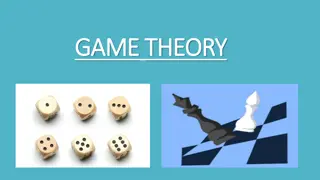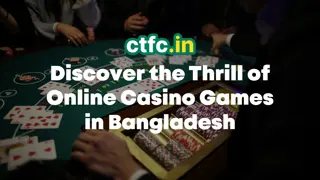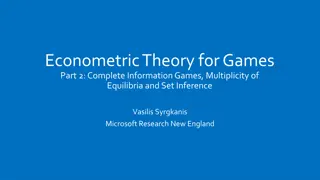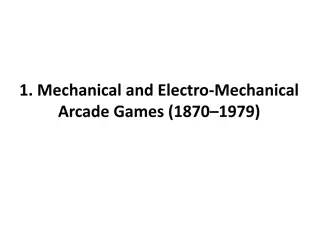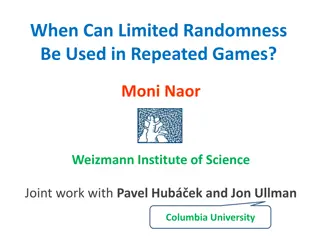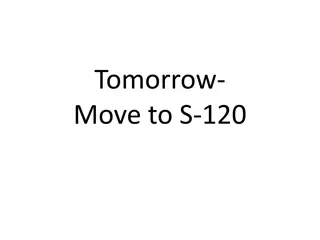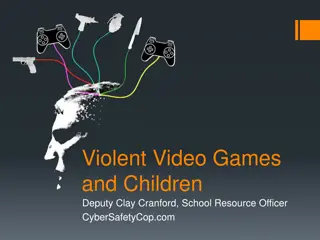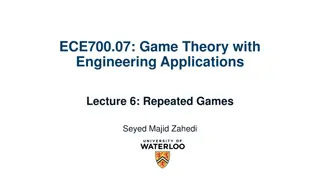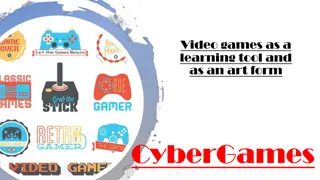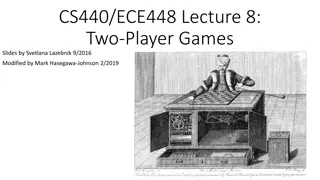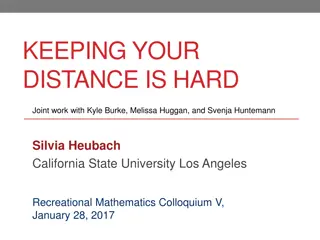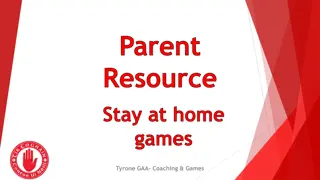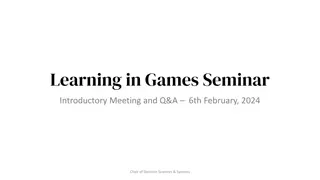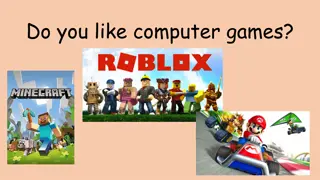The Importance of Studying Games in AI
Exploring the significance of studying games in the context of Artificial Intelligence, this content delves into the clear success criteria, historical importance, fun aspect, and application of search techniques in complex problems like chess. It also discusses the types of games, strategic thinking, and the distinction between human and computer strengths in gameplay evaluation and planning.
Download Presentation

Please find below an Image/Link to download the presentation.
The content on the website is provided AS IS for your information and personal use only. It may not be sold, licensed, or shared on other websites without obtaining consent from the author.If you encounter any issues during the download, it is possible that the publisher has removed the file from their server.
You are allowed to download the files provided on this website for personal or commercial use, subject to the condition that they are used lawfully. All files are the property of their respective owners.
The content on the website is provided AS IS for your information and personal use only. It may not be sold, licensed, or shared on other websites without obtaining consent from the author.
E N D
Presentation Transcript
Adversarial Search CS51A David Kauchak Spring 2019 Some material borrowed from : Sara Owsley Sood and others
Admin Assignment 10
A quick review of search Problem solving via search: To define the state space, define three things: is_goal next_states starting state Uninformed search vs. informed search what s the difference? what are the techniques we ve seen? pluses and minuses?
Why should we study games? Clear success criteria Important historically for AI Fun Good application of search hard problems (chess 35100 states in search space, 1040 legal states) Some real-world problems fit this model game theory (economics) multi-agent problems
Types of games What are some of the games you ve played?
Types of games: game properties single-player vs. 2-player vs. multiplayer Fully observable (perfect information) vs. partially observable Discrete vs. continuous real-time vs. turn-based deterministic vs. non-deterministic (chance)
? Strategic thinking = intelligence For reasons previously stated, two-player games have been a focus of AI since its inception Important question: Is strategic thinking the same as intelligence?
? Strategic thinking = intelligence Humans and computers have different relative strengths in these games: humans computers ? ?
? Strategic thinking = intelligence Humans and computers have different relative strengths in these games: humans computers good at evaluating the strength of a board for a player good at looking ahead in the game to find winning combinations of moves
? Strategic thinking = intelligence How could you figure out how humans approach playing chess? humans good at evaluating the strength of a board for a player
How humans play games An experiment was performed in which chess positions were shown to novice and expert players - experts could reconstruct these perfectly - novice players did far worse
How humans play games Random chess positions (not legal ones) were then shown to the two groups experts and novices did just as badly at reconstructing them!
People are still working on this problem http://people.brunel.ac.uk/~hsstffg/frg-research/chess_expertise/
Tic Tac Toe as search If we want to write a program to play tic tac toe, what question are we trying to answer? Given a state (i.e. board configuration), what move should we make!
Tic Tac Toe as search X X O O O O X X X X X X O O O O X
Tic Tac Toe as search How can we pose this as a search problem?
Tic Tac Toe as search X X X
Tic Tac Toe as search X X O X O X O
Tic Tac Toe as search Eventually, we ll get to a leaf X X X X O O O X X O X O X O X O X LOSE X O X O O O X X O WIN TIE How does this help us? Try and make moves that move us towards a win, i.e. where there are leaves with a WIN.
Tic Tac Toe X s turn x x x O s turn x o x o x o X s turn Problem: we don t know what O will do
Im X, what will O do? X O X X O X O O s turn X O X X O X X O X X O X O O O O
Minimizing risk The computer doesn t know what move O (the opponent) will make It can assume that it will try and make the best move possible Even if O actually makes a different move, we re no worse off. Why? X O X X O O X X O X X X O X X O O O O O O X X
Optimal Strategy An Optimal Strategy is one that is at least as good as any other, no matter what the opponent does If there's a way to force the win, it will Will only lose if there's no other option
Defining a scoring function X X X X O O O X X O X O X O X O X LOSE -1 X O X O O O X X O WIN +1 TIE 0 Idea: define a function that gives us a score for how good each state is higher scores mean better
Defining a scoring function X X O O O O Our (X) turn X X What should be the score of this state? +1: we can get to a win
Defining a scoring function X O X X O X O Opponent s (O) turn What should be the score of this state? -1: we can get to a win
Defining a scoring function X O X X O X O -1 Opponent s (O) turn X O X X O X X O X X O X O O O O +1 -1
Defining a scoring function X O O Our (X) turn X What should be the score of this state?
Defining a scoring function X O Our (X) turn O X X O O turn O What s the score of this state? X X X O X O O O X O X O O O O X turn O O +1 +1 +1 +1 X O X X X X X X X O X X O X X O O O O X O X O O O X O X +1 +1 +1 +1 X O X X X X X X X
Defining a scoring function X O What s the score of this state? Our (X) turn +1 O X X O O turn +1 O X X X O X O O O X O X O O O O X turn O O +1 +1 +1 +1 X O X X X X X X X O X X O X X O O O O X O X O O O X O X +1 +1 +1 +1 X O X X X X X X X
Defining a scoring function X O Our (X) turn What should be the score of this state? 0: If we play perfectly and so does O, the best we can do is a tie (could do better if O makes a mistake)
How can X play optimally? When it s my turn, pick the highest scoring state When it s the opponent s turn, assume the lowest scoring state (from my perspective) If we can reach the end games, we can percolate these answers all the way back up
How can X play optimally? Start from the leaves and propagate the score up: if X s turn, pick the move that maximizes the utility if O s turn, pick the move that minimizes the utility Is this optimal?
Minimax Algorithm: An Optimal Strategy minimax(state) = if state is a terminal state score(state) else if MY turn over all next states, s: return the maximum of minimax(s) else if OPPONENTS turn over all next states, s: return the minimum of minimax(s) Uses recursion to compute the value of each state Searches down to the leaves, then the values are backed up through the tree as the recursion finishes What type of search is this? What does this assume about how MIN will play? What if this isn t true?
Baby Nim Take 1 or 2 at each turn Goal: take the last match What move should I take?
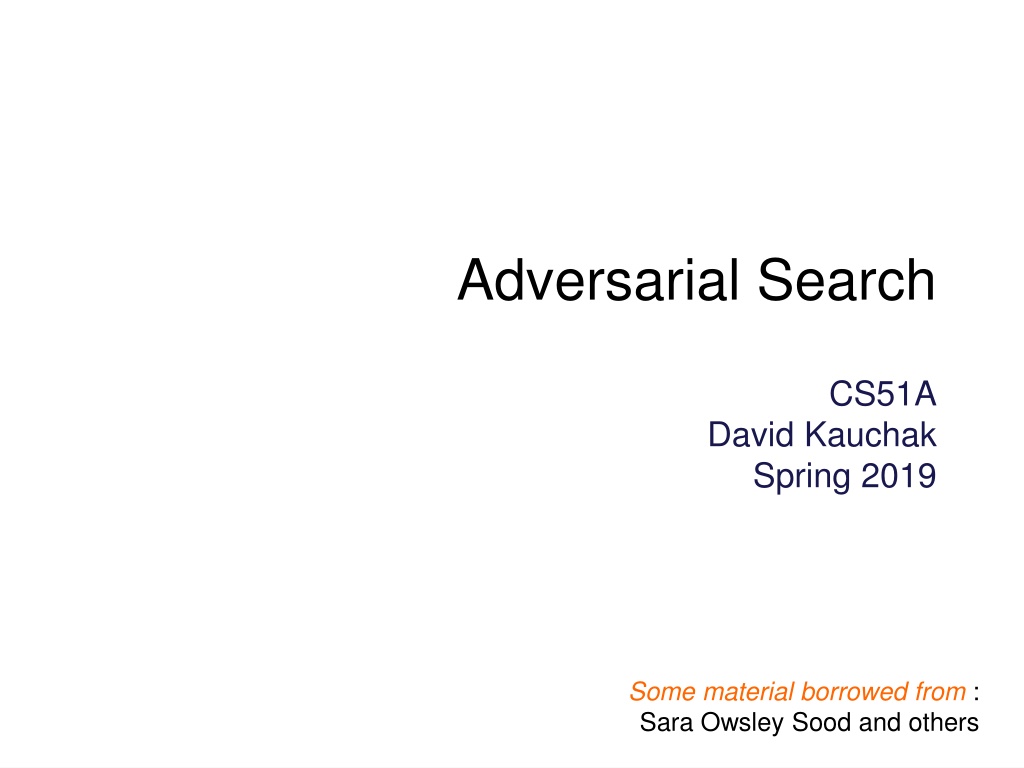
 undefined
undefined











